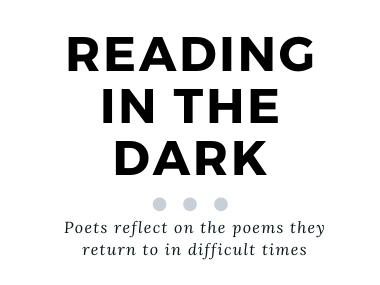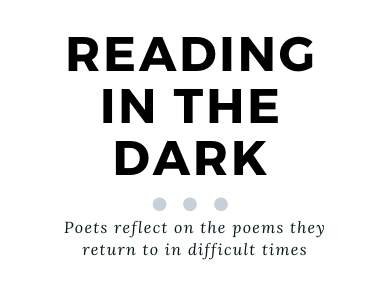Reading in the Dark
Naomi Shihab Nye on Lena Khalaf Tuffaha’s “Lullaby”

Lullaby
We cannot carry you,
our arms warm and dry
too late at the shore
of what has cradle-fallen
what sent a woman who fears the sea
what sent a man who fears the burning
skies of his country
into the razor-edged waves.
We cannot carry you,
tiny boat capsized,
upturned fish floating
in the glass bowl of our screens.
We cannot carry you.
We sink deeper, beyond
the midnight zone.
How to measure the trenches
of our silence, little one?
We want things smaller than we know.
A vessel strong enough
to lift you into tomorrow,
a life jacket or two,
a pair of small shoes
pressing into the sand.
From Arab in Newsland by Lena Khalaf Tuffaha (Two Sylvias Press, 2017). Reprinted with the permission of the author.
In response to the Coronavirus pandemic, we asked poets to write about the poems they return to in difficult times—to find solace, perspective, or even a moment of delight. Subscribe to the PSA newsletter for more Reading In The Dark responses and to keep updated with the PSA.
I return to the poems of Lena Khalaf Tuffaha over and over again these days, as many of us return to poems of humanity, compassion and grace, desperate for their sustenance. They offer the wide eye of care, a steadiness, a shared grief around all we cannot cure. It makes no difference if the poems were written for different circumstances. Sorrow is not exclusive. Human images of trauma abounding everywhere—and I disagree with the idea that you have no right to mention Gaza, for example, in relation to the sorrows of Ferguson, or the lockdown, now, or you shouldn’t “appropriate” the pain of migrants while considering thousands of people swept away by a virus. It’s not appropriation. It’s remembrance. Connection. It’s cognizance. So much unfair. If you’re dying, or love someone who’s dying, this is the worst thing ever, but if you’re watching, and waiting, you have the luxury of making other connections. It’s what the mind does. It’s what poetry invites. I think we should remember Gaza and the indescribable suffering of migrants every single day. We should keep talking about them. It’s that howling, that acknowledgement that they’re also drowning or they’re still locked down, worse than we could ever be, families trapped and overlooked for generations. Maybe poems don’t exactly solve the problems of inadequacy many of us feel in such overwhelming seasons of collective sorrow and grief—but they shine a light, they continue to ask the questions, make the connections, they express the immensity. What are we doing here? What else might we do? Remembrance, identification—one of the timeless gifts of poetry. Are we “appropriating” the 1918 flu epidemic because it keeps being mentioned? “We cannot carry you”—but we want to. We want to carry one another. We want the CNN heroes of our own neighborhoods to be cherished, and remembered. We don’t want to turn our heads and pretend you weren’t even there. Lena Khalaf Tuffaha gazes straight on. She doesn’t turn her head. She has also said, in the same book, “It always begins with a question” and “You are inside the calendar” and in her poems, I find immense solace and hope for better, wider attentions, and hoped-for healing of more human woes.
—Naomi Shihab Nye
Naomi Shihab Nye is the author or editor of more than 30 volumes. In 2019 she was named Young People's Poet Laureate by the Poetry Foundation and in 2020 she was awarded the Ivan Sandrof Award for Lifetime Achievement by the National Book Critics Circle. She is Professor of Creative Writing—Poetry at Texas State University.

